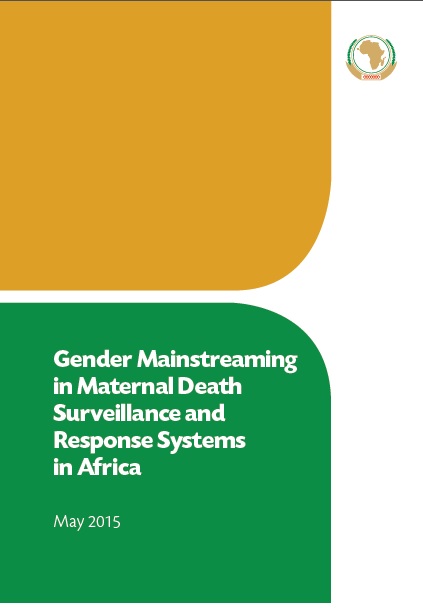
Gender Mainstreaming in Maternal Death Surveillance and Response Systems in Africa

Guided by the Continental Policy Framework on Sexual and Reproductive Health and Rights and its Maputo Plan of Action, African countries have made significant strides in the fight to reduce preventable maternal and child deaths over the past decade. Despite commendable achievements, challenges still continue to hinder progress at the required rates of change. Africa remains a highly risky region for women to become pregnant and give birth; women in Africa, still face a 1 in 39 lifetime risk of dying due to pregnancy or child-birth related complications. In 2013, there was an average of 800 maternal deaths daily worldwide; of these 500 occurred in Africa excluding North Africa.
Efforts to address poor maternal health have traditionally included provider focused interventions to improve access to quality health services. However, as maternal mortality ratios remain stubbornly high throughout large parts of the world, attention is shifting to the impact of social and cultural factors on women’s access to healthcare. This includes gender inequality in the form of decision making, education, access to property and investment opportunities as well as violence and harmful traditional practices.
In line with the declaration of the 15th Ordinary Session of the AU Assembly held in Kampala, Uganda in 2010, maternal deaths should be notifiable. Maternal Death Surveillance and Response (MDSR) is meant to account for each maternal death and put in place interventions to prevent future deaths. These systems allow governments to track, systematically review, and subsequently address factors that contributed to maternal deaths. Implementing and strengthening MDSR systems in the continent is among the key strategies advocated by the AUC Campaign for Accelerated Reduction of Maternal Mortality in Africa (CARMMA) to reduce maternal mortality. Previous assessments of maternal death audit systems have pointed to their use to track and respond to direct medical causes of death and review gaps at health facilities. As we start to acknowledge that gender discriminatory behaviours and practices are some of the underlying causes of fatal maternal outcomes, it is important that the systems capture and address the sociocultural factors contributing to maternal death.
It is my pleasure to present this report, which looks at gender inequality and its relation to maternal mortality and proposes practical ways to make MDSR systems more gender sensitive and responsive. I believe adoption of the proposed recommendations is an important step in the fight to reduce the unacceptably high maternal mortality rates on the continent. I call upon all stakeholders to work
together to ensure the MDSR systems are gender sensitive and responsive.
H.E. Dr. Mustapha S. Kaloko
Commissioner for Social Affairs